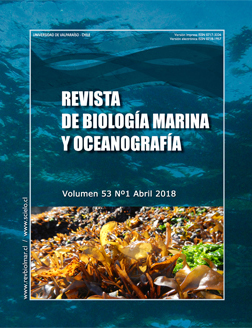Túnidos tropicales: calentamiento global y seguridad alimentaria, una visión global
DOI:
https://doi.org/10.4067/S0718-19572018000100001Palabras clave:
Calentamiento global, Seguridad alimentaria, Sostenibilidad, TúnidosResumen
El término ‘túnido tropical’ se refiere a un grupo de especies de peces escombriformes que incluye al listado o barrilete (Katsuwonus pelamis), el patudo (Thunnus obesus) y el rabil (Thunnus albacares), que presentan una amplia distribución pantropical, y cuyo óptimo de temperatura superficial del agua del mar en el que habitan se sitúa en torno a los 20°C. Actualmente, dos de estas especies se encuentran entre las 7 especies con mayores volúmenes de desembarque a nivel mundial. Se prevé que en el futuro los stocks de túnidos tropicales jueguen un papel fundamental para salvaguardar la seguridad alimentaria. El objetivo de este trabajo fue presentar los principales retos de la biología pesquera en relación a la gestión de las poblaciones de túnidos tropicales en un contexto de cambio climático. Para esto se revisaron los estudios que se han abordado hasta el presente sobre el efecto tanto de las oscilaciones climáticas, como del calentamiento global en las poblaciones de túnidos tropicales.
Descargas
Descargas
Publicado
Número
Sección
Licencia
• Los autores que publican en la RBMO transfieren sus derechos de publicación a la Universidad de Valparaíso, conservando los derechos de propiedad intelectual para difundir ampliamente el artículo y la revista en cualquier formato.
• La RBMO autoriza el uso de figuras, tablas y extractos breves de su colección de manuscritos, en trabajos científicos y educacionales, siempre que se incluya la fuente de información.






